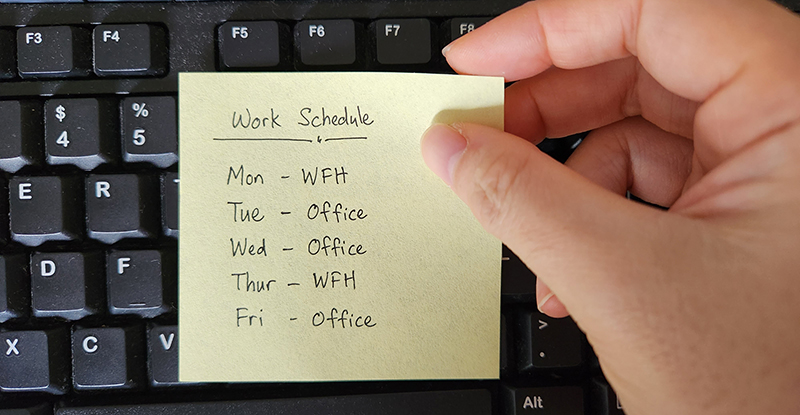
Listen to our podcast episode with this article's author Glen Sollors, where he discusses with Leah Giesbrecht, communications specialist with CPABC, strategies for getting out of burnout. Part of our Coffee Chats with CPABC podcast series.
Access mental health resources through Telus Health
All members, candidates, and students, along with their immediate family members, have access to confidential help through the Telus Health (formerly LifeWorks) Member Assistance Program. You can access the program by phone, web, or mobile app:
- Toll-free: 1-844-880-9142
- Web: login.lifeworks.com
- App: Download the free LifeWorks app on Android or iOS from Google Play or the App Store (username: bccpa; password: Lifeworks)
“I feel like I’m running on fumes.”
“I’m just going through the motions.”
“I’ve got nothing left to give.”
There are many ways to describe feeling burned out. Whether you’re working from a virtual or physical office, you have probably heard a few of them.
But burnout is a term that is often overused. It’s different from the tiredness or the general anxiety that we all feel from time to time. Burnout is a state of emotional, physical, and mental exhaustion that is caused by excessive and prolonged stress. When we are burned out, we can’t perform well in life and at work and it is virtually impossible to lead ourselves and others. So, in order to take care of ourselves, how can we assess if we are burned out? And if it turns out that we are, what can we do to start getting out of burnout?
Assessing burnout and its impacts
Different levels to burnout
There are actually five levels to burnout. The first is feeling exhaustion and fatigue – maybe you are a bit anxious and as a result you are not sleeping well. This is followed by detachment and feelings of being ineffective at work and/or in life. Then come physical symptoms caused by chronic stress, such as headaches, stomachaches, and gastrointestinal issues.
The next level is characterized by feelings of hopelessness and loss of productivity. And at the top level is habitual burnout, where eventually your system goes into overload from experiencing chronic stress. This is when the nervous system breaks down and starts telling you that things have to change.
These descriptors can sound depressing and even frightening. But it’s important to recognize and acknowledge them. This is a starting point for getting out of burnout.
Feelings, emotions, and physical symptoms
There are also certain feelings and emotions that accompany burnout. But it’s important to separate one from the other and understand how they differ.
Emotions are your physical and neurological response to what you’re experiencing in the moment. Basic emotions are generally identified as happiness, sadness, fear, and anger. Emotions are mediated by your brain’s amygdala, which moderates your body’s response to fear, stress, and other experiences. Let’s say you encounter something that is a threat. Your amygdala will coordinate your response by triggering the emotion of fear, followed by a fight or flight response such as an increased heart rate to prepare for action.
Feelings are how you describe an emotion, or the mental aspect of what you experience. In the context of burnout, the emotions of sadness and fear might lead to feelings of shame, guilt, upset, and depression. People who are burned out might also experience feelings of withdrawal, anxiety, detachment, or cynicism.
Physical symptoms can include heart palpitations, headaches, digestion issues, insomnia, chronic fatigue, brain fog, as well as body aches and pains. When we’re burned out, many of these symptoms can be brought on by prolonged cortisol levels caused by chronic stress. If you are experiencing stress and feeling one or more of these symptoms, chances are it's your body telling you enough is enough. Something has to change.
What you can do to start getting out of burnout
Just breathe
It sounds simple, but when you are stressed out it’s essential to remember to breathe. That’s the main thing. Deep abdominal breathing has been shown to counter chronic stress and its effects. Be intentional in catching yourself in the moment. If you are feeling stressed, acknowledge it. Say, "Wow, I feel stressed out right now.” Then pause and breathe deeply and slowly. This will not only help you relax but also reduce activity in the amygdala related to fear or anger.
Be self-aware about the things that you would love to deal with, but you're not
Maybe there are more demands placed on you and your time is being pushed to the limit. Maybe you’re saying yes too often; you’re not asserting yourself because you don't like conflict. In these scenarios, there’s a conversation that needs to be had because you need to take care of yourself.
Look at those things that are taking up your time and energy and that cause you to feel the emotions, feelings, and physical symptoms of burnout. Ask yourself: What's the truth I'm not dealing with? What am I pushing under the rug or ignoring?
In a workplace context, maybe you decide to look at everything you need to do as part of your job and ask yourself:
- What are some limits I can set?
- How can I restructure my day?
- Is there something maybe I'm doing in my day that's taking up a lot of my time?
- Am I not focusing enough on something because I'm distracted by something else in my life?
These questions can help you assess what is important to you and what is not that urgent. Once you’ve done that, you can try to optimize how you are spending your time at work so that you have more control.
Look at your underlying drivers
There's a reason you do what you do. For example, there's a reason why you like to control things. There's a reason why you like to try to fix other people. There's a reason why you try harder and harder to prove yourself. And if you take the time to look early in your life, you will likely find some connections.
In our younger years, where our neurological patterns start emerging, we create habitual ways of being. We learn how to survive in this world. For example, as an adult, it might be hard for you to relax. Look back to your childhood.
You might’ve thought that to be appreciated by your parents and to be loved and cared for, you needed to try harder. Or that you needed to try to fix your parents because they had a lot of conflict. Or you needed to control things because if you weren’t controlling you didn’t feel safe. Now, as an adult, you are preoccupied with trying harder, fixing people, and controlling things. And this makes it impossible to relax!
Knowing your childhood experience and reflecting on it can help you choose to shift the beliefs you have about yourself – that you don't need to control everything, you don't need to fix everyone. That is what you had to do way back then, but it doesn't make any sense now.
By acknowledging your history, you are in a better place to do things differently. Go for a new pattern in your life. Choose to act and react differently, in a way that serves you. It's the hardest thing to do. However, repetition is the answer. It's going to take time.
Get input from outside: Ask what other people think
Rene Descartes once said, "I think, therefore, I am." When you are burned out this quote can sound more like, “I feel stuck in burnout, therefore, I am burned out.” This is a challenge – if you feel stuck in a negative state, it seems to lead to more of the same.
Sometimes to get us out of that place we need something dramatic to happen. This can mean asking for help. This is probably one of the biggest things we can do to start getting out of burnout. Talk to people. Because by speaking out, we can find solutions.
Engage your family or friends. What are they noticing that's different in you? After all, if you are burned out, other people are going to pick up on your energy. They're going to pick up on the words you’re using, how you’re displaying yourself, your body language. And that can have a negative impact on other people. For example, you might come home and bring your stress from work to your home environment.
Oftentimes, if we have chronic stress we may not notice how it shows up in our behaviours. So ask the people in your life, "What's different about me? I'm feeling a bit overwhelmed. Is there anything you're noticing?" And they'll likely tell you. By opening up, you will have the opportunity to make some connections, find some answers, and make some progress towards getting out of burnout.
Author
Glen Sollors is a partner at the business consulting firm Kwela Leadership and Talent Management and a presenter with CPABC’s Professional Development Program. Glen has over 20 years’ experience in driving results by working with leaders in developing strategic business opportunities, managing associated change, and enabling team success through role modeling, training, self-awareness, coaching, and problem solving.



